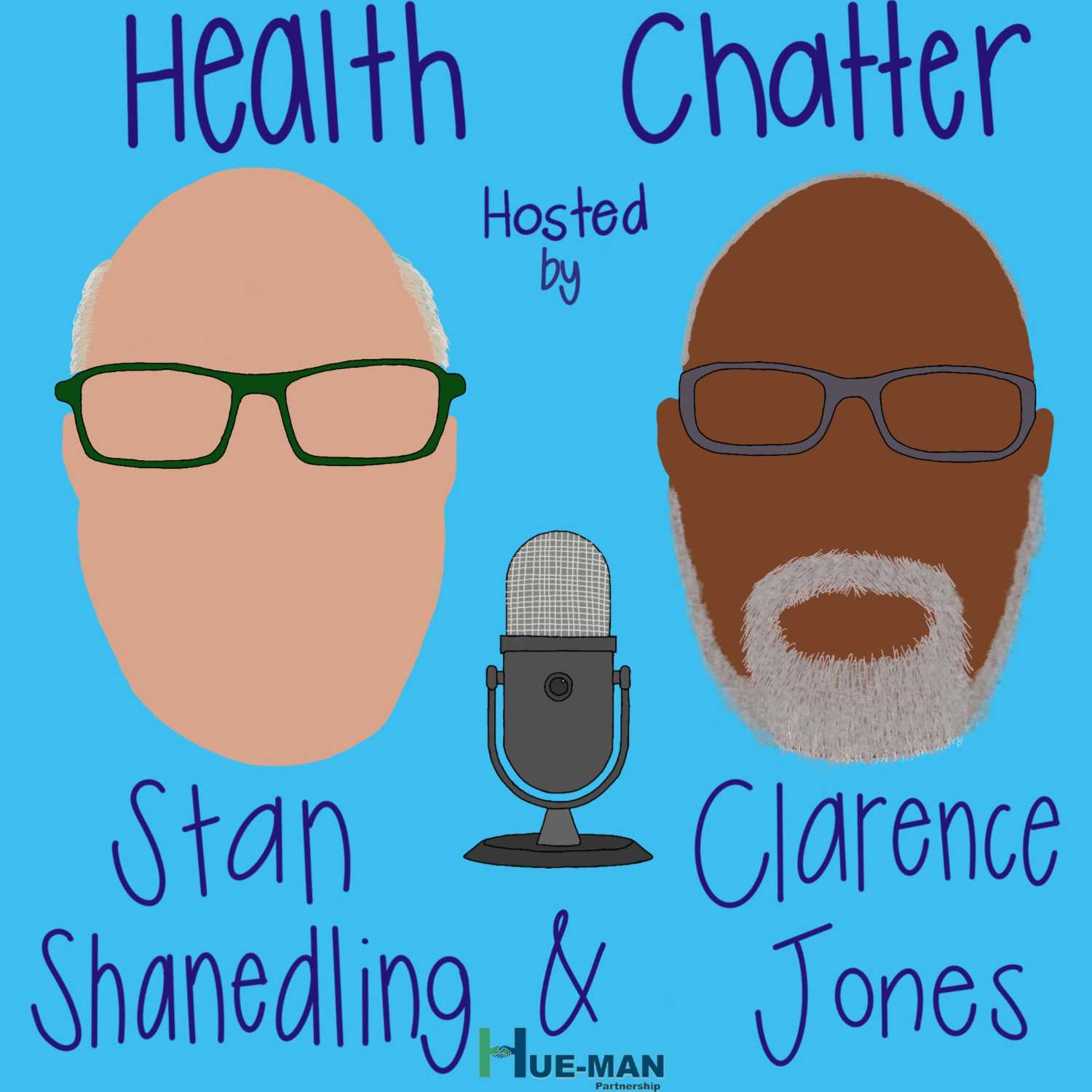Sleep and Sleep Disorders

Dr. Charlence McEvoy joins Health Chatter to explain the importance of sleep and detail common sleep disorders.
Dr. McEvoy is an internal medicine specialist in lung and sleep health with special interests in sleep, obstructive airway disease, COPD, and bronchiectasis. Dr. McEvoy has completed research in Asthma, COPD, and adult sleep. Currently, Dr. McEvoy is the co-investigator in the NIH-sponsored COPD Research Network and COPD gene trials. Past experiences include Principal Research Investigator at HealthPartners Institute, Medical Director at Regions Sleep Center, Assistant Professor of Medicine at UMN Medical School, Co-chair of HealthPartners Asthma Expert Panel, and Co-Director of HealthPartners Asthma Center.
This is an episode not to miss.
As always, Join the conversation by leaving comments and reviews on our new website healthchatterpodcast.com
Brought to you in support of Hue-MAN, who is Creating Healthy Communities through Innovative Partnerships. More about their work can be found at http://huemanpartnership.org/
Research
- Sleep Overview
- Why is sleep important?
- Sleep accounts for one-quarter to one-third of the human lifespan
- “Sleep is essential to every process in the body, affecting our physical and mental functioning the next day, our ability to fight disease and develop immunity, and our metabolism and chronic disease risk” (University of Michigan School of Public Health)
- During sleep, your body works to support healthy brain function and maintain your physical health
- Sleep helps with growth and development for children and teens
- Not getting enough sleep over time can increase the risk of long-term health problems
- How much sleep do we need?
- Adults: 7-9 hours per night
- Children and teenagers: 8-10 hours per night
- Tired v. fatigue
- Tired is natural → it’s normal for people to feel tired after a busy day at work or after exercising
- Fatigue is more intense than just feeling tired → persistent feeling of exhaustion, lack of energy, or inability to do much can sometimes be a sign of something more serious
- Clinical aspects of sleep
- During sleep (non-REM), blood pressure and heart rate fall
- Sleep is also associated with hormone cycles, metabolism, respiratory system, immune system, memory, alcohol use, and screen time
- Four stages of sleep: stage 1 NREM, stage 2 NREM, stage 3 NREM, REM
- Caffeine and sleep
- Caffeine can impact sleep time, sleep efficiency, and sleep satisfaction levels
- Older adults might be more susceptible to caffeine-induced sleep troubles
- Overconsumption of caffeine can lead to insomnia symptoms or worsen pre-existing insomnia
- Caffeine from soda has been linked to increasing the severity sleep-disordered breathing (primary characteristic of sleep apnea)
- Although it may seem counterintuitive, some people report feeling tired from caffeine instead of more alert
- Sleep Disorders
- One-third of US adults report getting less than the recommended amount of sleep
- Sleep apnea
- Gasping or snorting noises when sleep is interrupted
- Those with sleep apnea can experience excessive daytime sleepiness
- Treatment depends on the cause → CPAP machines are one example
- Obstruction of the airway and interruption of regular breathing during sleep can pose serious health risks such as high blood pressure, diabetes, and heart attacks
- Insomnia
- The inability to initiate or maintain sleep
- Can result from a stressor combined with the fear of being unable to sleep
- Individuals with insomnia sometimes sleep better when not in their own beds
- Treatment options include medications and/or behavioral techniques
- Narcolepsy
- Common signs/symptoms include excessive daytime sleepiness combined with sudden muscle weakness
- Often described as “sleep attacks” that can occur in unusual circumstances like walking or other forms of physical activity
- Treatment options include medications, behavioral interventions, and scheduled naps
- Snoring
- Hoarse or harsh sound that occurs when air flows past tissues in your throat causing the tissue to vibrate as you breathe
- Around 45% of adults snore occasionally, while 25% of adults snore regularly
- Can be associated with a sleep disorder called obstructive sleep apnea
- Symptoms include excessive daytime sleepiness, morning headaches, restless sleep, gasping/choking at night, high blood pressure, chest pain at night, etc.
- Risk factors for snoring include biological sex, being overweight, having a narrow airway, drinking alcohol, having nasal problems, and family history
- Snoring affects 57% of men and 40% of women in the US
- Treatment includes lifestyle changes such as maintaining a healthy weight and limiting alcohol consumption, anti-snoring mouthpieces, mouth exercises, CPAP machines, and/or surgery
- Jet lag (also known as jet lag disorder)
- Temporary sleep problem that can affect anyone traveling quickly across several time zones
- Occurs when your body’s internal clock hasn’t adjusted to the new time zone, and is still synced to your original time zone
- Can cause daytime fatigue, feeling unwell, trouble staying awake, and stomach problems
- Can be prevented or reduced by resting, gradually adjusting schedule before traveling, staying hydrated, etc.
- Risk factors across populations
- Older adults, those with a family history, biological sex, lifestyle habits, stress levels, and medical disorders can increase the risk of insomnia
- Insomnia symptoms also occur more frequently in lower-income areas, minority communities, neighborhoods with high crime rates, and urban areas with more nighttime light exposure
- Biological sex, obesity, neck circumference, narrowed airway, age, family history, smoking status, alcohol use, and certain medical conditions can increase the risk of sleep apnea
- Men are 2-3x more likely to have sleep apnea than women
- Questions for Dr. McEvoy
- Why is there pushback from the sleep/research community against daylight savings time?
- What makes certain animals nocturnal?
- How can people improve their sleep?
Sources
- https://www.healthpartners.com/care/find/doctor/8643/
- https://www.linkedin.com/in/charlene-mcevoy-07100123
- https://www.nhlbi.nih.gov/health/sleep/why-sleep-important#:~:text=During%20sleep%2C%20your%20body%20is,long%2Dterm
- https://www.sleepfoundation.org/how-sleep-works/why-do-we-need-sleep
- https://sph.umich.edu/pursuit/2020posts/why-sleep-is-so-important-to-your-health.html
- https://www.cdc.gov/sleep/features/getting-enough-sleep.html
- https://www.hopkinsmedicine.org/health/wellness-and-prevention/the-science-of-sleep-understanding-what-happens-when-you-sleep
- https://www.sleepfoundation.org/nutrition/caffeine-and-sleep
- https://www.mayoclinic.org/diseases-conditions/jet-lag/symptoms-causes/syc-20374027
- https://www.cdc.gov/sleep/about_sleep/key_disorders.html
- https://www.cdc.gov/sleep/about_sleep/key_disorders.html
- https://health.clevelandclinic.org/why-am-i-so-tired/



